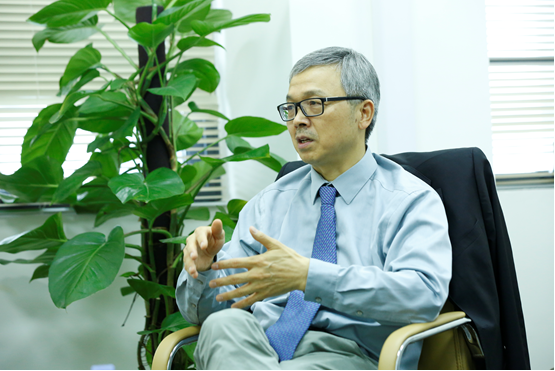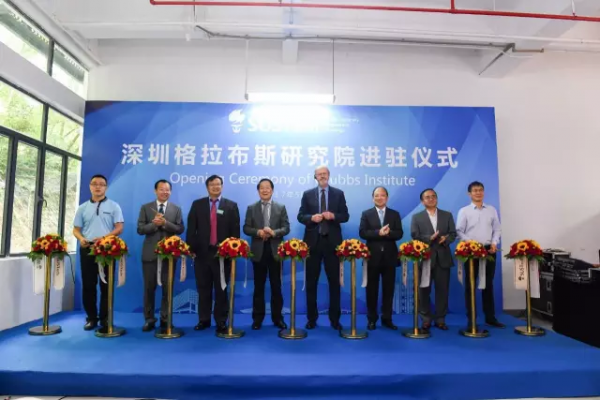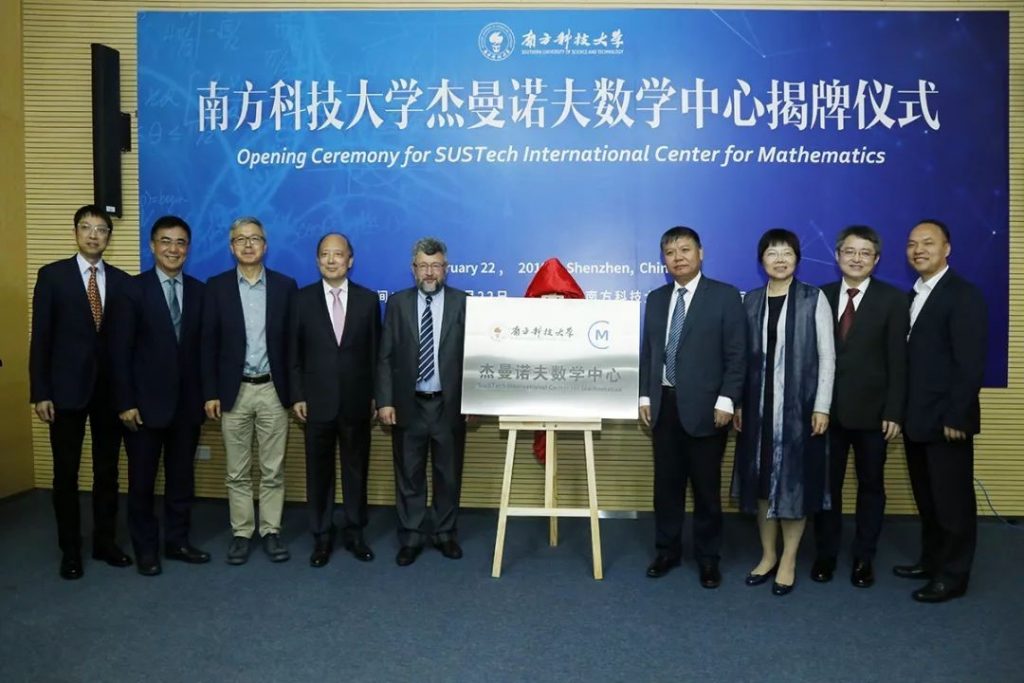Since its establishment, SUSTech has been focusing on both basic and applied research. It has long been working to lay a solid foundation in the basic sciences such as mathematics, physics and chemistry – the cornerstone departments for all high-profile universities.
Scientific, innovation-driven urban development has always been a focal point for SUSTech and with that in mind, the development of the College of Science at SUSTech will enhance the interdisciplinary approach of “new science education.”
Accordingly, the College of Science was established in December 2017, with Yang Xueming as its founding Dean.
Since it foundation, the College achieved a lot of highlights by focusing on basic science research, including the establishment of SUSTech International Center for Mathematics, Professor Tan Bin’s team being published in Science on the four-component Ugi reaction, and Associate Professor Zhang Liyuan from the Department of Physics confirming the existence of the 3D quantum Hall effect.
What is the next step and future plan of the College, and what kind of education will they offer? We had an interview with the Dean of the College of Science.
To create history of SUSTech

Professor Yang Xueming is a world-renowned physical chemist. Currently, he serves as the vice chairman of the Chinese Chemical Society, the director of Chemical Sciences Division of National Natural Science Foundation of China (NSFC).
As the recipient of National Science Fund for Distinguished Young Scholars and first batch of National special support program for high-level personnel recruitment, he is recognized as a fellow of both the American Physical Society and Royal Society of Chemistry. In 2011, he was elected as an academician of the Chinese Academy of Sciences.
Professor Yang Xueming traveled from Dalian to Shenzhen in 2017 to become the Dean of the College of Science at SUSTech, a new institution within a young university. It was an opportunity to write his pages of history at SUSTech.
As he recalled the past, this was not his first time to SUSTech.
The founding President of SUSTech, Academician Zhu Qingshi was Yang’s tutor during his graduate study. He was invited to attend SUSTech’s first convocation. Later, he got several chances to deliver lectures on campus.
Yang Xueming was attracted to SUSTech because of its innovative spirit. He said that University Council Chairperson Guo Yurong and President Chen Shiyi talked with him many times while he was mulling over the decision. Ultimately, he determined that SUSTech was a place he could do something that he could not do anywhere else.
As Yang has been here for one year, and he felt that the overall quality of the students is high. When students were in class and experimenting, they could think independently, and raise new questions. The faculty members are also of high quality, with everyone working really hard and full of energy. “The assertive and determined people here have been contributing to the rapid development of SUSTech,” said him.
Nowadays, he is the Dean and lived a typical “SUSTech” life every day. He arranges daily scientific research and administrative affairs, shuttling between the laboratory and the office every day during the summer vacation.
In his opinion, this is to squeeze the time as much as possible to think about the problem. ”It is very important to solve the problem, whether to conduct research or promote the development of the College. It is very important to identify the problem, think about it, and then solve it. In this way, you could do one thing well.”
Building the foundations for a top interdisciplinary college
It is Yang Xueming’s view that there are interdisciplinary development opportunities beyond the classroom and laboratory that are far greater than what can be gained from study within an individual discipline.
“SUSTech has implemented a well-balanced development strategy for all its disciplines, which lays a good foundation for the interdisciplinary and integrated research and education,” Yang Xueming said.
The College of Science encourages an integrated, interdisciplinary approach across all departments, both within the College and across SUSTech as a whole, especially for enhanced communications between disciplines within the College, as well as the collaborations between science and engineering.
Yang Xueming pushes this approach as a result of his own education experience, where his major in physics required significant knowledge of chemistry. Throughout his career, he has made important contributions in reaction transition dynamics and non-adiabatic dynamics, using internationally advanced scientific instruments that he developed himself. His research results saw Yang Xueming land on the Top Ten Scientific and Technological Progress for China in 2006 and 2007 – an achievement attained by few scientists in mainland China.
“Learning a subject is like learning a language. When you think about it, interdisciplinary studies develop a wider path and increase the opportunities for achieving the best results, as opposed to studying just one subject.” As a result, the College of Science will further build a multi-disciplinary teaching system. As for the general education, the College of Science will create opportunities for students to take courses across disciplines and grades, and fully explore their interests. The College’s mission is to cultivate a future leader with interdisciplinary background.

The opening ceremony for the Grubbs Institute Shenzhen

The opening ceremony for SUSTech International Center for Mathematics
Along with the five departments in the College of Science (Mathematics, Physics, Chemistry, Earth & Space Sciences and Statistics & Data Science), the College of Science adopts many approaches to enhance the cooperation within its departments and centers, including the Shenzhen Institute of Quantum Science and Engineering, Grubbs Institute Shenzhen, and the International Center for Mathematics, named after Fields Medal winner Efim Isaakovich Zelmanov.
“By the time the College of Science building is finished, the constituent departments and research institutes will all work together under one roof. It will be more convenient and effective, as everyone will be able to interact more efficiently. It will create more conducive conditions for interdisciplinary education, research and development.”
The College currently has 112 teaching and research professors, including 4 academicians of the Chinese Academy of Sciences, 1 foreign academician of Australia, 7 recipients of National Science Fund for Distinguished Young Scholars, 12 recipients of National Special Experts, and 33 National Special Experts (Young Scholar).
Next, the College will further introduce and cultivate high-level talents of interdisciplinary backgrounds, while promoting the research and development of the interdisciplinary sciences, and build the College of Science into a first-class research-oriented college.
To cultivate future science leader with interdisciplinary background
The College of Science is blessed with enormously talented faculty members, including academicians and fellows. The College of Science is also working to create high-level interdisciplinary talent pipeline development programs, that will support its research and teaching goals. Facing the needs for social and strategic development for the Greater Bay Area, the College of Science will take advantage of its critical disciplines and their role in laying the foundations for basic research in attracting interdisciplinary talent at every educational level, from undergraduate to Ph.D. level.
“The cycle of the basic discipline innovation may be slightly longer, but it may play a greater role.” Yang Xueming emphasized that it is very important to lay a good foundation in learning basic disciplines. While vigorously cultivating talents with interdisciplinary backgrounds, the College also attaches great importance to education in the basic disciplines.
While vigorously cultivating interdisciplinary talents, the College of Science has attached great importance to the basic scientific knowledge of students. He said that while helping students lay their scientific foundations, scholars should also encourage students to face their difficulties and cultivate their curiosity and be willing to ask questions. Yang Xueming said, “To do a good job, understanding foundational science is often the key. A good foundation helps us understand faster.”
Yang Xueming and the College of Science leadership group believe that talent cultivation is its most important work. They have explored many new measures to enhance their interdisciplinary studies within the ambit of their basic scientific education.
For example, the Department of Mathematics has started to carry out graded teaching in its basic courses, and design course content based on students’ abilities by the course project leader. The Department of Chemistry explores research-based teaching for undergraduate, and initiated the research-orientated flipped classrooms. Some courses have synchronized their theoretical teaching with their experimental practice. The Department of Physics is exploring new models of talent development, and organizing students to participate in experimental physics competitions both within China and around the world.
In addition to professional guidance for students, the College of Science arranges more than 100 professors to serve as life tutors in the residential college. It provides guidance to over 32% of the undergraduate students on campus to help students to adapt and plan their future studies.
With the strong support of the College of Science, students have achieved significant success, with undergraduate students publishing dozens of papers, including more than a dozen SCI-quality papers. Students have succeeded in domestic and international competitions, including 37 awards in 2018 American College Students Mathematical Modeling Competition, and 17 awards in the 2018 National College Students Mathematical Modeling Competition.
With the 2019-2020 academic year commencing, the innovative genes of SUSTech and Shenzhen are coming to the fore within the College of Science. Under the leadership and management of Yang Xueming, the College of Science will continue to foster an academic culture imbued with cutting-edge interdisciplinary education that cultivates the understanding of a solid foundation in order to build high-quality future scientific leaders. The College of Science will develop its talent pipeline and stride towards its goals of developing itself into a world renowned basic and applied research College of Science within China and around the world.
Proofread ByXia Yingying
Photo ByWang Kaiqiang, Qiu Yan